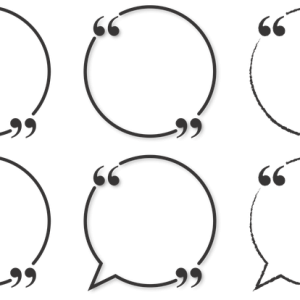“I am looking for authors with a distinctive voice.” [on an agent’s website] “Great premise but I couldn’t connect with the writer’s voice.” [publisher’s rejection] “The voice isn’t strong enough in the first ten pages to make me keep reading.” [agent rejection letter] So what do editors mean by “voice” when they talk about the craft of writing? Voice is the individual writing style of… [Read More]
As an editor I see one four letter word overused and abused more than any other. T. H. A. T. That. Many times it serves no grammatical purpose whatsoever. It is a filler word. You use it in conversation to signal to others a pause, like a verbal comma, to give the impression to a listener you haven’t finished speaking. In writing, however, it is… [Read More]
If you watch a lot of movies, then you’ve likely seen continuity errors. In Jurassic Park, there is a scene where programmer-turned-thief Dennis Nedry converses live with an accomplice on his computer but the workstation clearly shows he’s speaking to a pre-recorded video instead. Plot hole. Arnold Schwarzenegger plays an action hero in Commando where he badly damages his Porsche giving chase and in the… [Read More]
If you seek traditional publication for your book manuscript, then it is incumbent upon you to obtain copyright permissions for any text or images which are not original. The book will not go to print until every written permission has been secured. Because publishing is a for-profit venture, an author cannot include the copyrighted work of others without permission and it is not covered under… [Read More]
Julia Cameron advocates “morning pages.” Three pages of longhand, stream of consciousness writing, done first thing in the morning. Every morning. The Artist’s Way. Natalie Goldberg recommends writing daily for at least twenty minutes. Free the writer within. Keep your hand moving, lose control, and don’t think. Writing Down the Bones. Stephen King prescribes the writing routine of butt-in-chair habitually. Set writing goals and write… [Read More]
Many aspiring authors think they can’t afford to hire an editor. If your plan is to publish, then the truth is you can’t afford NOT to hire one. Anyone can call themselves an “editor,” yet not all editors are the same. There is no test or certification process. Be choosy when you hire one. Instead of looking for the cheapest rate, look for editors with… [Read More]
Do we need quotation marks? Who needs punctuation? Times are a-changing. One of the signs punctuation marks are in flux is the air quotations people make with their fingers when using words ironically. In print, we’ve seen the rise of single quotation marks around sarcastic words or phrases, even though the standard rule for single quotation marks are for use inside double quotation marks to… [Read More]
Front Matter is one of the last sections of a book manuscript for an author to complete. But it’s the first thing a reader sees. Before page 1, there are several items that appear in the front pages of any book. Some pages are mandatory: title, copyright, and table of contents. Others are optional. Every page before the first one in Chapter 1 is paginated… [Read More]
“I am looking for authors with a distinctive voice.” “Great premise but I couldn’t connect with the writer’s voice.” “The voice isn’t strong enough in the first ten pages to make me keep reading.” So what do editors mean by “voice” when they talk about the craft of writing? Voice is the individual writing style of an author. It’s the way a narrator tells their… [Read More]
Anyone who enjoys the painstakingly difficult process of writing probably has a love for words, which inspires their masochistic writer’s journey. Those who understand the slight intricacies of words and the importance of sentence structure choose their statements wisely, editing, re-editing, and editing again. This process is multiplied twofold for a writer who speaks more than one language, carrying with them the difficulty of creating… [Read More]












